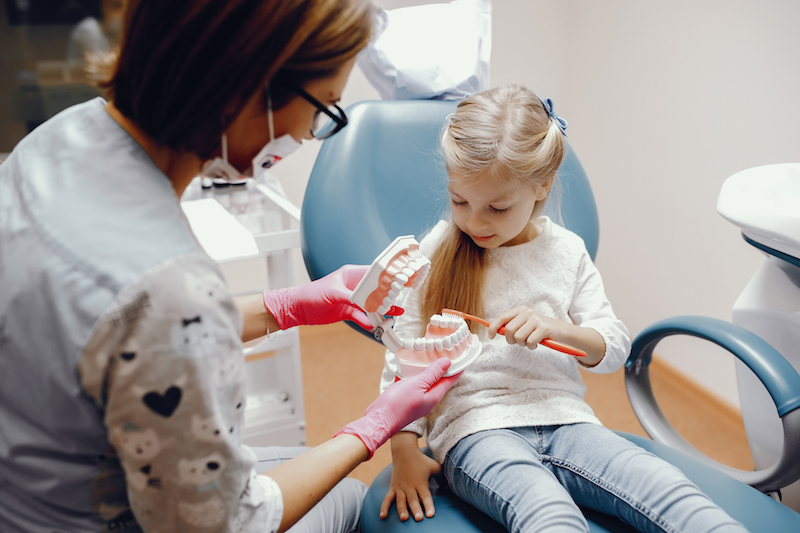Cavity Prevention

Primary teeth (baby teeth) may be temporary, but they’re crucial to your child’s healthy permanent tooth development. Preventing cavities while young helps your child speak and chew comfortably, develops confidence, and also guides permanent teeth as they form. Creating a positive experience with the dentist’s office (with as few cavities as possible) also helps your child feel great at the office and prevents early dental anxiety.
Your child’s dental attitudes last for life. We’ll do everything possible to make those attitudes positive ones with effective cavity prevention & patient education.
How We Help Your Child Prevent Cavities in the Office
Typically, your child should have a dental exam and cleaning every six months. Dr. Hester will let you know if he recommends a different appointment schedule based on your child’s dental health. At these appointments, we’ll evaluate your child’s teeth, jaw and mouth to ensure healthy development. We may take x-rays depending on how long it’s been since their last exam. We’ll also clean your child’s teeth and discuss any individual steps recommended for their oral health.
Other potential components of your child’s exam are listed below.
Patient Education
Your children benefit from learning how to take care of their teeth themselves. By sharing the best brushing and flossing tactics and demonstrating in the office, we’ll help them feel natural cleaning their teeth. We’ll also instruct you on the best ways to help your children brush and floss regularly, and find products that help them have fun with the process.
If you ever have questions about your child’s oral health, don’t hesitate to get in touch! We love talking oral hygiene and getting kids excited about clean, healthy teeth.
Dental Sealants
Sealants help prevent cavities in hard-to-brush teeth like molars. The tight nooks and crannies in these teeth are bacteria traps, and often fall prey to cavities. Sealants are thin coatings that are painted onto the teeth to help protect the enamel. Studies have shown sealants can reduce the risk of decay in molars by almost 80%, and children aged 6-11 without sealants have almost three times more cavities. You can learn more about the process on our Sealants page.
Strengthening Enamel with Fluoride
Fluoride is a natural mineral that helps strengthen enamel and prevent or slow cavities. Many communities, including Collier County, fluoridate their tap water. The use of fluoride toothpaste also helps with cavity prevention. Fluoride use is encouraged by the American Academy of Pediatric Dentistry, the American Dental Academy and the CDC. Simply drinking fluoridated water reduces cavities by 25%.
Fluoride varnish is an additional option to protect your child’s teeth. This is painted onto the teeth and then brushed off once it has strengthened the enamel. Dr. Hester may recommend this treatment while your child’s teeth are developing.
How to Help Your Child Prevent Cavities at Home
Your child only visits the office twice a year, so the bulk of their cavity prevention is performed at home. Dr. Hester and our team will provide you with the tools you need to support and encourage your kids as they care for their teeth. Please let us know if you’re ever feeling uncertain about the best way to ensure your child’s healthy tooth development.
Baby Bottle Tooth Decay
Cavities in infants and toddlers are often called baby bottle tooth decay. These most typically form in the upper front teeth because these are in contact with spoons and bottle tops when feeding. Follow these steps to reduce your child’s risk of baby bottle tooth decay:
- Avoid sharing saliva with your child through a shared spoon or licking a pacifier clean
- Wipe your child’s gums with a clean washcloth after feeding
- Avoid putting juice or soft drinks in bottles – use them for milk/formula only
- Don’t put your infant to bed with a bottle
- Start encouraging your child to use a cup by their first birthday
Consistent Oral Hygiene
- Once the first tooth has erupted, brush teeth with a child’s toothbrush and a smear of fluoride toothpaste until age 3
- Brush teeth with a pea-sized amount of fluoride toothpaste from ages 3-6
- Keep an eye on your child’s brushing until they’re old enough that you can depend on them to spit out the toothpaste rather than swallowing it (usually by 6-7). Brush together for a fun family activity!
- By age 9-10, your child will have many adult teeth and can switch to an adult toothbrush and toothpaste
- Always follow the 2 for 2 rule: brush two times a day for two minutes each time
- Start flossing your child’s teeth once they have two teeth that touch (age 2-3); kids usually need help with their flossing until 8-10.
- Ask Dr. Hester for examples of some flossing methods to find the way that’s most comfortable for you and your child
Healthy Eating Habits
A healthy diet is the cornerstone of both your child’s dental health and overall wellness. Aim to provide your kids with a variety of vegetables, fruits, dairy and whole grains on a daily basis. Limit the sugars and starches they consume to help prevent cavities. Always encourage them to drink water, including after eating to help cleanse their teeth of any cavity-causing bacteria.
We are your allies in your child’s dental health journey – just reach out if you ever have questions!